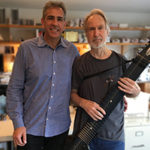King Crimson bassist talks about new double quartet and more
By Gary Graff
June 19, 2017
Dos Equis has the Most Interesting Man In the World. Bass playing has Tony Levin. The resume alone — with Peter Gabriel to King Crimson, John Lennon, Pink Floyd, Paul Simon and scores of others, including solo projects — testifies to Levin’s skill and taste on both bass and the Chapman Stick. Whenever we look, Levin always has something interesting going on; this year it’s King Crimson, but an entirely different King Crimson than ever before. Starting last year, group leader Robert Fripp assembled what he’s calling a “double quartet,” a lineup that puts Levin in the midst of four drummers (three playing together at any one time) in addition to Fripp and veteran Crimson saxophonist Mel Collins. The group has been touring steadily and recently released an EP, Heroes, of live recordings from Berlin on its last European tour. We caught up with Levin at home in upstate New York during a break from Crimson duty…
FBPO: A double quartet? It’s never not interesting in King Crimson, is it?
Levin: No, that’s correct. And it’s never the same. King Crimson has its own way of doing things.
FBPO: Is that always a wonderful thing, or does it drive you nuts sometimes?
Levin: For me it’s always wonderful…I wouldn’t have chosen the word wonderful, but for me it’s a challenge and a challenge is something that I look forward to. And I’ve referred to the band before as a band that challenges itself as a band, but also we challenge ourselves as individual players. So my time with King Crimson is for me, aside from trying to learn to perform well the King Crimson material, here’s my chance to up my game, to up my playing and not settle for whatever I’ve been doing in the last however long — not very long in this case, only about a year, and we did another tour with King Crimson. But still I’m trying the techniques, new sounds…I’m trying not to settle for the same old stuff, because to me that’s part of what the band is about.
FBPO: What are the unique challenges of this format of the band for you as a player?
Levin: The big thing about this incarnation is that there are three drummers…We actually have four drummers, but only three of them are playing at a time. So we have three drummers, and the drummers have put a great deal of work and ingenuity into devising drum approaches, so it’s never just the three of them bashing the same part. It’s divided up among them in fascinating ways that vary throughout each piece. So you can imagine for me, as the bass player, a part of the rhythm section trying to hold together something coherent in all this stuff, this new stuff, it has indeed been a challenge. And one that I look forward to. I dreaded it a bit a few years ago when we started with this idea, but it turned out to be easier than I thought it would be and a lot of fun and a good challenge.
FBPO: What was the most important part of the process of finding your place in this?
Levin: A challenge for me was finding the frequency with which the bass could be heard. I ended up throwing out some of my low-lows, just because they’re not appropriate and not needed in this situation. So I’m grateful to the drummers that they found ways to play it that are not just bashing and overwhelming — the downbeats, and things like that. So at any time there can be one bass drum playing that I can sort of focus on, but within one bar it might be from different people, from different directions in that one bar. That’s one of the challenges.
FGPO: Is there material in the Crimson catalog that works better than others with this format?
Levin: We’ve actually looked at some of the old, classic King Crimson material, which is great stuff which I haven’t played — I’m talking about from the ‘60s and ‘70s, before I was in the band. And the challenge of that is not so much technically playing it, but some of those bass parts are just fantastic parts. And I want to keep what’s special about them, but also don’t want to be a cover bass player and just do exactly what John Wetton did, as great as it is. So the challenge is to musically find a way to insert my own personality, sonically, at least, into the piece and not lose what’s very special about the bass part. I don’t have anyone helping me or giving me feedback with any of that shit, or anyone judging me, for that matter, but that’s my own little challenge which I go through whenever we tackle some classic King Crimson pieces.
FBPO: Take us inside one of those pieces and how you accomplished that.
Levin: Let’s take “Starless and Bible Black,” which starts out discreet, in my opinion, kind of a classic rock ballad with a beautiful vocal, and slow. And then came the bass part; it’s wonderful and accurate, but there’s nothing distinctive. I didn’t hear anything distinctive about it, so I feel that that section I can be me. I can play things off the root and do things that are a little more my style and get away with it. But then when it gets to the middle section and it breaks down with just the bass, and it’s a very specific part—it breaks down and it’s only the bass, nothing else is playing, so of course I stay with that part. Now in that second section, the band [moves] gradually, the guitar comes in and the drums come in and the words—gradually that stuff gets louder and louder with the bass continuously playing the same part over and over again.
FGPO: How much influence do your Crimson predecessors have on the way you approach the material?
Levin: John Wetton had a wonderful ability to dig in harder and harder and make the bass sound change just by the way he played it, with the way he touched it. That’s great, but I can’t do that so well. It could be the basses that I play—if I dig in harder and louder, it doesn’t really sound like I’m getting louder. I’m stressing out the bass amp and stuff like that. I don’t know exactly how he did it. Actually, frankly, I’ve watched it—I’ve watched him as a fan, and it’s just in his hands and his bass. And it’s wonderful. So now I’m confronted with something that’s an integral part of the piece and I want to do it, but I actually can’t. I’ve tried different ways to actually overcome that, with pedals and different basses, I’ll pull out a different bass that maybe has a little crunch in it, and it starts to go on a little musical adventure that is my own. That’s one example of how I’m chasing the classic part but I’m also being myself.
FBPO: Is it profound for you in the wake of John’s passing and Greg Lake’s passing? You were already the longest tenured King Crimson bassist, but is there something a little more profound about it now?
Levin: I do not feel that way. As always when someone reaches my age and great musicians and artists pass away, one is made unhappy by that. But one is also grateful to be alive and still be playing and be healthy enough to do what one does, I do have that feeling; I think like any fan I mourned the loss of those guys, I was a fan of those parts and those people. And, gee, I don’t think it’s affected my role really in the band. In the band, I don’t think about myself and how I am in the band or anything about what I’m doing, I think I just focus on the music, that’s what we all do. And what other things happen will be analyzed by other people But it’s certainly an odd thing to be the bass player in a band where the classic guys who’d been doing what you’re doing are falling by the wayside…I felt heavily the challenge of finding the right bass approach in the band, from the beginning. And that has not changed with their passing.
FBPO: Speaking of Crimson history, it must be cool to have Mel Collins be part of this.
Levin: It is. I’m not an authority of the Crimson history, but he’s a heck of a player and a great guy. And to have—all the years I was in King Crimson before this incarnation it was pretty much a guitar band. And to have the saxophone playing, it completely changes the feel of it, to me. And his flute playing is also marvelous. And yes, it harkens back to the way King Crimson sounded way back when. I don’t want to say the year, because I could get it wrong. Yes, it harkens back to then, but to me it has more resonance, because it takes you to a different place. Not really a jazz place, but a less guitar-rock place.
FBPO: How does this group improvise together?
Levin: Like all the guys, I’m just listening to what goes on around me, with seven other players there’s a lot going on around me, and I listen and react to that. And with the improv, everybody plays improv differently, but it’s profoundly different if you have a guitar player playing the lead in an improv section than if you have a saxophone playing the lead. It just takes it to a different place. And when I say improv, I don’t mean the guys are just making up their part at the time, what we call in Crimson the improv sections are parts where there’s nothing written at all. Everybody’s free to play whatever they want, there’s no parameters. As opposed to when you play a blues, and you’re improvising a part, in soul, that’s different.
FBPO: And you just take on faith that everyone’s gonna lock in with each other and it’s going to go well?
Levin: Everyone hopes. And the wonderful thing about that kind of improv is when you have really good musicians, when it gels, when it really happens well there’s something magical about it. Because, how did that happen? You couldn’t make it happen because you want it to. And the other side of that, there are nights when, gee, it ain’t that good, and we laugh about it, and I’m happy being in a band where you can take chances and the reality of it is that there is gonna be nights where that improv section just dies, and it’s not like it’s horrible, it’s not like there’s bad musicians in the band. So that’s necessary for it to reach other heights on other nights.
FBPO: It’s very cool that this version of Crimson is doing David Bowie’s “Heroes” and even put it out on an EP.
Levin: The reason for that, for those who don’t know, is that Robert had played a particularly distinctive guitar solo and line on that piece and what a hoot and what a surprise for the audiences that we added it. Especially the first audience to hear it. Pretty shocking, and very pleased. And it’s also drastically simple compared to even the simplest stuff of King Crimson, which makes it fun also. So we recorded, we record all our shows, but the one night we did it in Berlin was, as you can imagine, very special.
FBPO: Is there going to be more original music from this double quartet?
Levin: Oh, sure. There has to be. As much as I can say will happen in the future of King Crimson — I don’t think anybody can predict completely that, as much as I can guess — there will be a studio album of new material. And the reason for that is we keep writing new material and introducing it into the live show and releasing it on the live albums. So yes, we’re slowly introducing brand new material, in addition to the improv sections, which are different every night. But there is no plan for a traditional studio album of new material. And I guess that there won’t be one, because that involves, what, taking a year off of touring to write the stuff and getting together for a month in the studio and mixing it and things like that. And that seems not to be the trajectory that King Crimson is on.
FBPO: Last year you were back with Peter Gabriel for the Rock Paper Scissors Tour with Sting. What was that like?
Levin: It was beyond marvelous; it was fantastic. I knew it would be really good because Peter’s great. I love touring with Peter. I’m a fan of Sting and I knew how great he is. But I didn’t know how great that tour would be. It was really special. And the reason was largely because of Sting. I mean Peter was Peter and he was fantastic doing his thing. And Sting was just, he came up with his approach of instead of having it be one band and then the other, let’s meld these bands together. It’s a way to collaborate. And I think the audience, especially after the first few shows, really got and appreciated that, that these guys really love each other’s music and they’re happy to be participating in it and for those in the band it was really special to, in Peter’s band, it was really special to get to play on Sting’s material. I didn’t get to play on all of it, of course, because Sting is a bass player—and a hell of a bass player at that—but I certainly just stayed onstage was just kind of like “Wow, I’m onstage with this wonderful stuff going on around me.” Plus even though I knew how good a bass player, really good bass player, Sting was, I didn’t realize until watching him up close how great a bass player he is, all the really subtle little things that only a bass player could really appreciate. And there I was, a perfect view of it, right behind him. Watching his fingers and appreciating his musicality and his ability to do that while he’s singing a part, and it’s the vocal that’s really grabbing the audience. Meanwhile, he’s driving the band with his bass technique. Pretty amazing.





